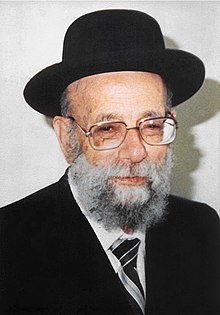Yehuda Tzadka
| Rabbi Yehuda Tzadka | |
|---|---|
 |
|
| Position | Rosh yeshiva |
| Yeshiva | Porat Yosef Yeshiva |
| Began | May 1970 |
| Predecessor | Rabbi Ezra Attiya |
| Successor | Rabbi Ben Zion Abba Shaul |
| Personal details | |
| Birth name | Yehuda Yehoshua Tzadka |
| Born | 13 January 1910 Jerusalem, Israel |
| Died | 20 October 1991 (aged 81) Jerusalem, Israel |
| Buried | Sanhedria Cemetery, Jerusalem |
| Parents | Shaul and Simcha Tzadka |
| Spouse | Fahima Batat Tamar Asuderi |
| Children | Moshe 4 other sons 2 daughters |
| Alma mater | Porat Yosef Yeshiva |
Yehuda Yehoshua Tzadka (13 January 1910 – 20 October 1991) was a respected Sephardi rabbi and rosh yeshiva of the Porat Yosef Yeshiva in Jerusalem. He became a student in the yeshiva after his bar mitzvah, and continued to study and teach there for almost 70 years.
Tzadka was born in Jerusalem to Shaul Tzadka, a Jewish merchant from Baghdad who had immigrated to Ottoman Palestine around 1900 with his wife, Simcha, a niece of the Ben Ish Chai. The family lived in the Beit Yisrael neighborhood, and young Yehuda attended Talmud Torah Bnei Tzion in the Bukharim Quarter. After his bar mitzvah he enrolled in Porat Yosef Yeshiva in Jerusalem's Old City, which had opened a year earlier. Following the death of rosh yeshiva Shlomo Laniado, Tzadka became a student of the new rosh yeshiva, Rabbi Ezra Attiya, from whom he continued to learn for the next 45 years.
Tzadka was a diligent student who rose to the top of his class. He studied by day in the yeshiva and at night in the Be'er Sheva synagogue in Beis Yisrael. Every Friday night he would study in the Shoshanim L'David Synagogue, where Sephardi talmidei chachamim (Torah sages) congregated.
In 1937 Attiya suggested Tzadka as a replacement for a senior Talmudic lecturer who was unable to continue teaching. Tzadka's first class included Rabbi Ovadia Yosef, Rabbi Ben Zion Abba Shaul, Rabbi Yehuda Moallem, Rabbi Baruch Ben Haim, and Rabbi Ezra Ades, all of whom would go on to leadership positions in the Sephardi Torah world. Tzadka taught in classic Sephardi style, focusing on the Talmudic commentaries of the Maharsha and the Maharam. Like Attiya, he also emphasized the study of musar (ethics) texts such as Mesillat Yesharim. He distinguished himself as a teacher by his ability to gear each lesson to the level of his students.
...
Wikipedia
